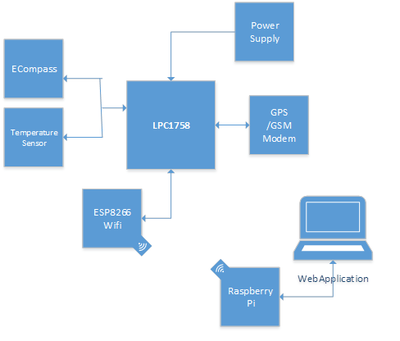Difference between revisions of "S16: Warriors"
Proj user6 (talk | contribs) (→Design & Implementation) |
Proj user6 (talk | contribs) (→Design & Implementation) |
||
| Line 162: | Line 162: | ||
== Design & Implementation == | == Design & Implementation == | ||
The design section can go over your hardware and software design. Organize this section using sub-sections that go over your design and implementation. | The design section can go over your hardware and software design. Organize this section using sub-sections that go over your design and implementation. | ||
| − | [[File:Block.png|center| | + | [[File:Block.png|center|400px|caption]] |
=== Hardware Design === | === Hardware Design === | ||
Revision as of 05:27, 21 May 2016
Contents
Grading Criteria
- How well is Software & Hardware Design described?
- How well can this report be used to reproduce this project?
- Code Quality
- Overall Report Quality:
- Software Block Diagrams
- Hardware Block Diagrams
- Schematic Quality
- Quality of technical challenges and solutions adopted.
Project Title
Internet of Things based GPS Tracking System
Abstract
A GPS & GSM Based Vehicle Tracking combine the installation of an electronic device in a vehicle, with purpose-designed computer software to enable the company to track the vehicle's location. We are using Global Positioning System (GPS) technology for locating the vehicle. Vehicle information can be viewed in Web application.
Objectives & Introduction
Show list of your objectives. This section includes the high level details of your project. You can write about the various sensors or peripherals you used to get your project completed.
Team Members & Responsibilities
- Sujeeth Emmadi
- Bharat Khanna
- Veena Manasa Kanakamalla
- Ankit Gandhi
- Rasberry Pi environment setup, Hardware support
Schedule
This section of the report provides the team schedule for the Assembly line project, indicating the milestones to be achieved during the course of the project.
| SI No. | Start Date | End Date | Task | Status | Actual Completion Date |
|---|---|---|---|---|---|
| 1 | 03/21/2016 | 03/27/2016 |
|
Completed | |
| 2 | 03/28/2016 | 04/03/2016 |
|
Completed | |
| 3 | 04/04/2016 | 04/10/2016 |
|
Completed | |
| 4 | 04/11/2016 | 04/17/2016 |
|
Completed | |
| 5 | 04/18/2016 | 04/24/2016 |
|
Completed | |
| 6 | 04/25/2016 | 05/01/2016 |
|
Completed | |
| 7 | 05/02/2016 | 05/08/2016 |
|
In Progress | |
| 8 | 05/09/2016 | 05/15/2016 |
|
In Progress | |
| 8 | 05/16/2016 | 05/22/2016 |
|
In Progress |
Parts List & Cost
| Item# | Part Description | Vendor | Qty | Cost |
|---|---|---|---|---|
| 1 | Raspberry Pi | Adafruit | 1 | $39.95 |
| 2 | ESP8266-Wifi Module | Adafruit | 1 | $9.95 |
| 3 | SIM808 GPS/GSM Module | Adafruit | 1 | $49.95 |
| 4 | Passive GPS Antenna uFL | Adafruit | 1 | $3.95 |
| 5 | USB to TTL Serial Cable | Adafruit | 1 | $9.95 |
Design & Implementation
The design section can go over your hardware and software design. Organize this section using sub-sections that go over your design and implementation.
Hardware Design
Raspberry Pi
- Raspberry Pi is powered with Broadcom BCM2837 1.2GHz 64-bit quad-core ARMv8 processor.
- Integrated 802.11n wireless LAN
- Raspberry Pi is used as Web Server
SIM808 GPS/GSM Module
- Raspberry Pi is powered with Broadcom BCM2837 1.2GHz 64-bit quad-core ARMv8 processor.
- Integrated 802.11n wireless LAN
- Raspberry Pi is used as Web Server
ESP8266 Wifi Module
- Raspberry Pi is powered with Broadcom BCM2837 1.2GHz 64-bit quad-core ARMv8 processor.
- Integrated 802.11n wireless LAN
- Raspberry Pi is used as Web Server
Hardware Interface
In this section, you can describe how your hardware communicates, such as which BUSes used. You can discuss your driver implementation here, such that the Software Design section is isolated to talk about high level workings rather than inner working of your project.
Software Design
Show your software design. For example, if you are designing an MP3 Player, show the tasks that you are using, and what they are doing at a high level. Do not show the details of the code. For example, do not show exact code, but you may show psuedocode and fragments of code. Keep in mind that you are showing DESIGN of your software, not the inner workings of it.
Implementation
This section includes implementation, but again, not the details, just the high level. For example, you can list the steps it takes to communicate over a sensor, or the steps needed to write a page of memory onto SPI Flash. You can include sub-sections for each of your component implementation.
Testing & Technical Challenges
Describe the challenges of your project.
- First and very important aspect for any project is requirement gathering.
Make a smooth transition to testing section and described what it took to test your project.
Include sub-sections that list out a problem and solution, such as:
My Issue #1 LPC17xx UART Rx FIFO
- LPC17xx UART not able to receive more than 16 bytes
- Resolution :
- Inside the interrupt reading as much data as available
Conclusion
Conclude your project here. You can recap your testing and problems. You should address the "so what" part here to indicate what you ultimately learnt from this project. How has this project increased your knowledge?
Project Video
Upload a video of your project and post the link here.
Project Source Code
References
Acknowledgement
Any acknowledgement that you may wish to provide can be included here.
References Used
List any references used in project.
Appendix
You can list the references you used.
